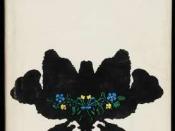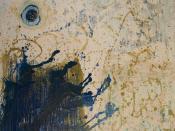Flowers for Algernon Final Essay
Vision can be perceived not just in the aspect of sight, but as an internal comprehension of occurring events. The "Alegory of the Cave," as defined by Greek philosopher Plato, is a theoretical representation of how one internalizes what they see and experience. In Flowers for Algernon, written by Daniel Keyes, the main character's comprehension rises rapidly, as he undergoes a surgical procedure meant to increase his I.Q. The theory of the "Alegory of the Cave" is represented as Charlie is subjected to "the light," or the truth, and in the idea that he is leaving the darkness behind him, bewildered and in awe. Through intellectual, moral, and emotional factors it becomes evident that Charlie is beginning to perceive situations differently as he comes into the "light," directly portraying vision and the impact it has as an internal force.
For instance, it can be seen the levels of intelligence in the novel Flowers for Algernon, shown through both the actions and words of Charlie.
In an early progress report, Charlie had written, "Burt is very nice and he talks slow like Miss Kinnian dose in her class where I go to lern reeding for slow adults," (19) demonstrating background information that allows the reader a more in-depth comprehension of Charlie's mental capabilities in the beginning of the book. As Charlie developes intellectually, there is an evident change in his actions, as well, such as when he designs a maze for Algernon. "It's a maze complex with three-dimensional walls," Charlie explained to his neighbor Fay, showing distinctive understanding of architectural boundaries, and, in turn, a stark change in an intelligence level.
In regards to moral aspects of the novel, there is an obvious change in vision and comprehension. Following the surgery, Charlie's nurse...


